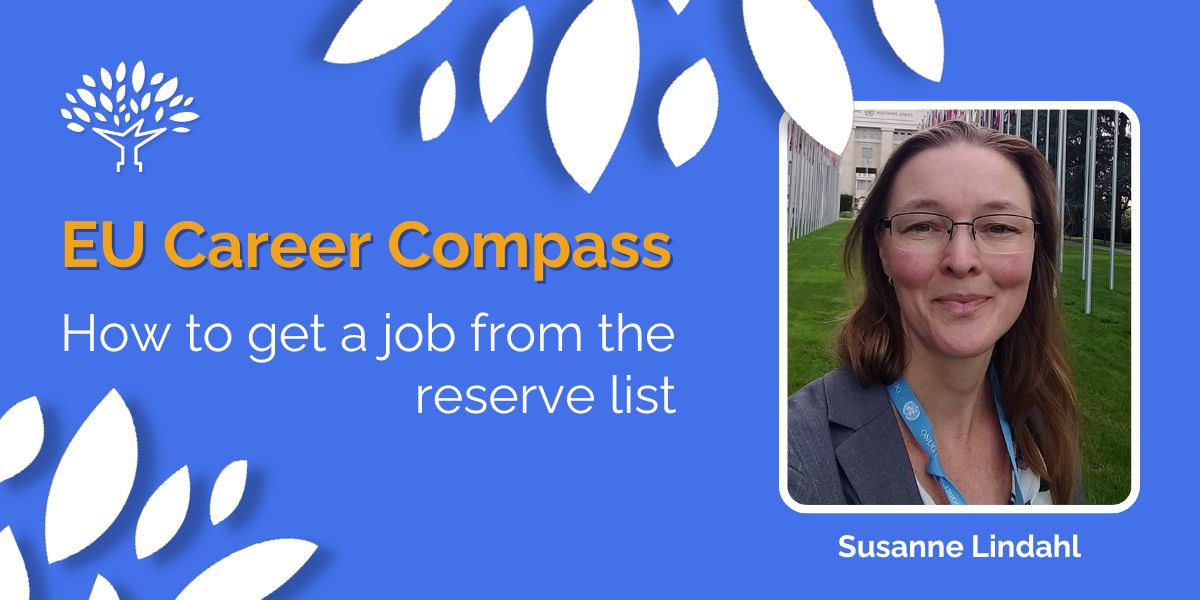
So, you’ve made it to the reserve list? Well done! You’ve done so much work preparing for the various tests, but the challenges are not quite over. There are still some hurdles before you have that dream job at an EU institution, and it will be a good job that is worth all this effort.
I learned a lot during my years at the European Parliament and the European Commission. I picked up new languages and met colleagues from all over Europe. As a permanent official, I was able to try new policy areas and evolve into new roles every few years. I always felt challenged and was never bored.
So, how do you get that interview, and how do you nail it? The answer is in these three important tips I’d like to share with you, tips based on my own experience.
- Get outside your comfort zone when applying
When I first got on the AD5 reserve list, I made the same mistake as so many political science generalists: I focused on jobs with “international” in the title. I didn’t dare go for the so-called technical DGs, even though I did know that this is where the interesting policy and legislation lies. I thought one had to be an engineer to work in DG MOVE or a biologist to work in DG ENV.
At some point though, I let go of that preconception and applied more widely. That’s when I started getting interview invites. In an interview for a road policy unit I (naively) blurted out: “to be honest though, I’m not a road traffic expert”. The Head of Unit looked at me kindly and answered “I know, I’ve seen your CV. I don’t need another road traffic expert. I need someone who can translate what the experts say into strategic policy”. And yes, as a political scientist, that is my exact expertise. I got the job.
Every unit needs a mix of skills. They need in-depth topic experts, they need lawyers, they need someone who understands socioeconomic analysis and statistics, and they need communicators. They need you. But if you don’t send them an application, they are unlikely to find you and recruit you (unless, of course, you have a very specific profile they happen to be looking for).
- Application letters must be short and sweet
A Head of Unit gets hundreds of emails every day, if not a thousand. They do not have time to waste on long application letters, no matter how eloquent. Your cover letter (email) needs to be very short and to the point. Key information only! The attached application letter shouldn’t be more than one page, or one and a half max, but only if you have something really relevant to write about.
A good, short letter will always be better than a long and complicated one:
- Write clearly, concisely, and correctly
- There should only be one key point per sentence.
- Proofread several times.
Your letter should also focus on what YOU can offer THEM. Any word or sentence not giving a clear argument as to why they might want you in that particular unit - delete it. Even (especially) if it’s your favourite sentence with truly elegant phrasing. Delete all the platitudes. Delete unnecessary details. Delete everything that is not 100% relevant.
Also: for that HoU to find your application letter later… make sure the email subject line is easily searchable. I recommend simply writing “Job application”.
- Prepare for the interview, and prepare well
People very often underestimate how much homework they should do before an interview. They often come well prepared for questions on skills and competencies. But the real test in a job interview at a DG is most often the factual questions. Yes, they will ask you factual questions about the work they do - the content and the processes.
You need to study before a job interview like you would for a university exam. Read their web pages, and study their policies, strategies and legislation. Take note of key figures, targets/objectives and keywords. Take the time to understand what type of work they do: Legislation? Implementation/compliance control? Funding? Communication and projects? What does this mean, how is it done, what kind of person do they need for it?
It doesn’t mean that you must be an expert in the field. But you need to show you tried, that you did your homework. The factual questions tell as much about your motivation as about your expertise. If you don’t make an effort before the interview, what are the odds you will make an effort on the job? If you didn’t even bother reading the unit web pages, why should they hire you?
To sum it up...
Don’t be put off if it takes a bit of time getting from the reserve list to a signed employment contract. It’s perfectly normal. You will probably need to send several applications and attend several interviews.
Never give up - this job is worth the effort.
Best of luck!
------------------------------------------------------------------------------------
Reserve List Webinar
Based on feedback from real people and presented by András Baneth, this on-demand recording, EPSO Reserve List Roadmap: Step-by-step to an EU Job, will provide actionable advice that you can apply to your EU career plans.
EU exams and interviews coaching with Susanne
Susanne's level of expertise and knowledge, plus her personal experiences working as a permanent official in the EU institutions are an invaluable addition to your EU exams preparation work. Book with a personal coaching session directly with Susanne on the links below.
